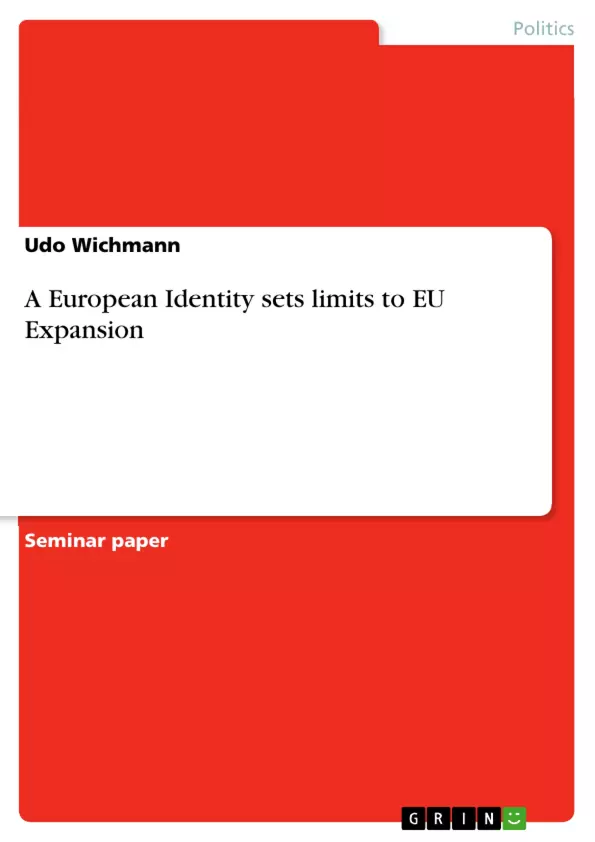The French philosopher Rémi Brague says that the European identity obtains its specific character directly and indirectly from the Christian religion, because Europe was formed through the Christianity . In addition to that, Samuel Huntington utters that religion is the central size for the delimitation of the different culture rooms and serves him for the de-finition of the limits of Europe .
Nevertheless, Wolfgang Burgdorf says that the Christianity is not a reference point for an identity concept because the Islam and the Christianity contains many anti-enlightenment characteristics. Furthermore from a historical point of view, you have to consider flexible, territorial limits of Europe from which you cannot derive any territorial limit of Europe . The present member countries of the EU are in a Christian tradition line. The statement, whether countries, which are in the tradition line of another world religion, cannot be-come a member of the EU, is normative.
The fact that for example Turkey isn't a Christian country isn't a reason to itself yet not to include them in the EU, because the religious freedom of the citizens is guaranteed by the EU and the freedom to be a Muslim is just included, too. The German historian Hans Ul-rich Wehler negates the statement, because from his point of view Turkey isn't a part of Europe concerning the geographical, historical, cultural and religious mentality .
Who decides, whether the Christian values take a role within the EU? Do the Christian values have to be taken into account if you want to define a European identity? Which criteria have to be met regarding the limits of the EU? And how does the discussion show itself at a federal political level? At first, I will discuss these questions before I work out, whether a European identity of the EU expansion sets limits.
Inhaltsverzeichnis (Table of Contents)
- Introduction
- European Identity vs. Border of the EU
- The border of the European Union
- European Identity - “Imagined Community”
- Influence of the Religious Values on the EU Expansion
- The Religious Worth within the EU
- The Connection between the EU and Turkey
- Political Debate for the EU-Joining of Turkey
- SPD
- BÜNDNIS 90/ DIE GRÜNEN
- DIE LINKE
- FDP
- CDU/CSU
- Conclusion
- What are the Criteria's about a Border of the EU?
- Is Religion as a Criterion an Obstacle for the EU Enlargement?
Zielsetzung und Themenschwerpunkte (Objectives and Key Themes)
This paper analyzes the concept of a European identity as a potential limit to the EU’s expansion, specifically focusing on the case of Turkey. It aims to examine whether the EU’s expansion is restricted by a specific European identity, particularly in light of differing religious values.- The role of religion in shaping European identity
- The importance of shared values for EU membership
- The debate surrounding Turkey's potential EU accession
- The challenges of defining a European identity in a diverse and evolving continent
- The geographical and cultural boundaries of Europe and their impact on EU expansion
Zusammenfassung der Kapitel (Chapter Summaries)
- Introduction: The introduction sets the stage for the paper by exploring the debate surrounding the influence of Christian religion on European identity and its implications for the EU’s expansion. The author highlights the conflicting views of various scholars and presents the key questions that will be addressed throughout the paper.
- European Identity vs. Border of the EU: This chapter investigates the concept of a European identity and its relation to the EU’s geographical borders. It analyzes the historical evolution of European borders and discusses the challenges of defining a clear boundary. The chapter also examines the role of shared values, such as human rights and democracy, in shaping the EU’s identity.5
- Influence of the Religious Values on the EU Expansion: This chapter focuses on the specific impact of religion on the EU’s expansion, particularly in relation to Turkey. It analyzes the importance of religious values within the EU and explores the historical and cultural connections between the EU and Turkey.7
- Political Debate for the EU-Joining of Turkey: This chapter delves into the political debate surrounding Turkey’s potential EU accession. It examines the perspectives of various German political parties, including the SPD, BÜNDNIS 90/ DIE GRÜNEN, DIE LINKE, FDP, and CDU/CSU, on Turkey’s membership bid.10
Schlüsselwörter (Keywords)
This paper examines the intricate relationship between European identity, religious values, and the EU’s expansion, with a particular focus on Turkey's potential EU accession. The key concepts explored include: European identity, EU expansion, religious values, cultural boundaries, political debate, shared values, and the historical and geographical perspectives on the concept of Europe.Frequently Asked Questions
How does religion influence the concept of European identity?
Scholars like Rémi Brague argue that Europe was formed through Christianity, while others believe that shared secular values like democracy are more defining.
Is Turkey's non-Christian tradition a formal obstacle to EU membership?
While religious freedom is guaranteed by the EU, some historians and politicians argue that Turkey lacks the cultural and religious mentality to be part of Europe.
What are the criteria for defining the borders of the EU?
Borders are defined by a mix of geographical, historical, and cultural factors, as well as the commitment to shared political values like human rights.
How do German political parties view Turkey's EU accession?
The debate is split: parties like the SPD and Greens have historically been more open, while the CDU/CSU often emphasizes cultural limits and "privileged partnership" instead of full membership.
What is meant by European identity as an "Imagined Community"?
It refers to the idea that European identity is a socially constructed concept based on shared narratives and values rather than just fixed territorial borders.
- Arbeit zitieren
- Udo Wichmann (Autor:in), 2009, A European Identity sets limits to EU Expansion , München, GRIN Verlag, https://www.grin.com/document/150265



